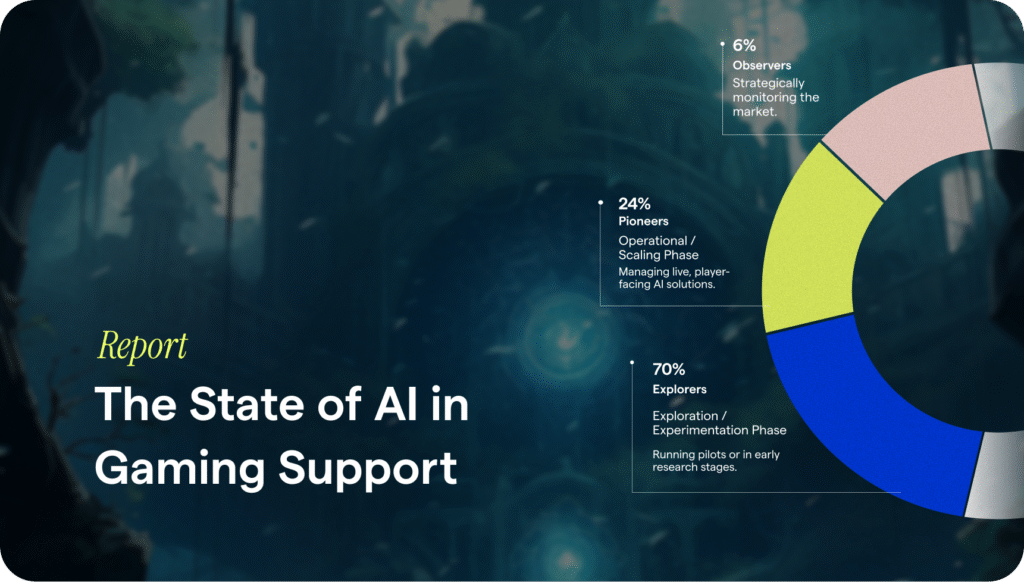Gaming companies face a unique support challenge: explosive growth paired with player expectations for instant resolution. When your latest update drops and 50,000 players simultaneously can’t log in, manual support crumbles under the weight of identical tickets flooding your queue.
The math is unforgiving. While entertainment companies have reached an impressive 83% automation rate, many gaming studios still rely heavily on manual processes. Each unautomated repetitive ticket costs you both money and talent retention—your best agents didn’t join your team to copy-paste the same password reset instructions 200 times per day.
Benefits of Automating High-Volume, Low-Complexity Requests
Data from across industries reveals a compelling truth: companies achieving full automation on routine inquiries see dramatically improved customer satisfaction scores and faster resolution times. The fintech sector, leading at 97% automation, demonstrates what’s possible when repetitive tasks are handled instantly by AI rather than queued for human attention.
For gaming companies, automation delivers three critical advantages:
- 24/7 instant resolution for common issues
- Freed-up agent capacity for complex problems requiring human judgment
- Consistent support quality that doesn’t vary based on agent workload or training gaps
When your AI handles account recovery automatically, your human agents can focus on nuanced issues like investigating potential cheating or helping players through complex technical problems.
For example, Helpshift’s AI-powered automation goes beyond simple chatbots. The platform creates intelligent workflows that can authenticate players, access account data, process refunds, and resolve issues without human intervention. Through in-app messaging, players get help without leaving your game, while automated issue resolution handles routine tasks like account recovery and payment inquiries seamlessly.
Repetitive Support Tickets You Can and Should Automate Today
1. Account Recovery and Login Issues
Authentication problems represent perfect automation candidates—high volume, standardized resolution steps, and clear success metrics. Automated systems can verify player identity through multiple data points, reset credentials, and restore access without agent involvement. Success rates often exceed 90% for standard account recovery scenarios.
2. Missing Purchases or Rewards
Purchase verification and item restoration follow predictable workflows ideal for automation. AI can cross-reference transaction records, validate purchase receipts, and automatically credit missing items or currency. This eliminates the frustrating multi-day wait that damages player trust and generates follow-up tickets.
3. Password Reset Requests
The most straightforward automation win—password resets require zero human judgment and follow identical steps regardless of player. Automated systems handle verification, generate secure reset links, and confirm completion, typically resolving these requests in under two minutes rather than hours.
4. Refund Inquiries
Refund eligibility can be determined algorithmically based on purchase timing, usage patterns, and your refund policy parameters. Automated systems can approve qualifying requests instantly and route edge cases to human agents, dramatically reducing processing time for straightforward refunds.
5. Basic Gameplay FAQs or Tutorial Questions
New player questions about game mechanics, controls, or basic features represent high-volume, low-complexity tickets perfect for AI resolution. Automated responses can include rich media like screenshots or video tutorials, often providing better guidance than text-based agent responses.
6. Device Compatibility or Crash Troubleshooting
Technical issues often follow diagnostic trees that AI can navigate more consistently than human agents. Automated troubleshooting can collect device specifications, identify known issues, and provide tailored solutions or escalate to human agents with complete diagnostic data already gathered.
7. Event Schedule & Patch Note Queries
Questions about game updates, event timing, and feature changes can be answered instantly by AI pulling from your current content management system. This eliminates the risk of agents providing outdated information while ensuring players get accurate, up-to-date details.
8. Ticket Status Checks (“Any update?”)
Status inquiries create additional ticket volume without advancing resolution. Automated systems can provide real-time updates on existing tickets, expected resolution timeframes, and next steps, reducing follow-up volume while improving player communication.
9. Ban Appeals or Policy Violation Clarifications
While complex appeals require human review, initial policy explanations and standard appeal processes can be automated. AI can explain violation reasons, outline appeal procedures, and collect necessary information for human review, streamlining the entire process.
10. Profile/Username Change Requests
Account modifications like username changes follow standard validation and processing steps. Automated systems can check availability, verify eligibility, process changes, and confirm completion without agent involvement, typically completing requests in minutes rather than days.
What Makes a Ticket Ideal for Automation?
High Frequency, Low Complexity
The best automation candidates appear dozens or hundreds of times daily but require minimal problem-solving. These tickets consume disproportionate agent time relative to their complexity—exactly where automation delivers maximum impact. Helpshift’s analytics identify these patterns automatically, showing you which ticket types are draining your team’s capacity.
Structured, Repeatable Workflows
Effective automation requires predictable resolution paths. Tickets following “if this, then that” logic—where specific inputs lead to predetermined outputs—automate successfully. Password resets, account verifications, and standard refunds exemplify this structured approach.
Minimal Need for Human Empathy or Judgment
While human agents excel at nuanced situations requiring emotional intelligence or complex decision-making, routine requests benefit from automation’s consistency and speed. Players experiencing technical issues want solutions, not empathy—making these perfect automation targets.
Case Examples of Automation in Action
Jam City: Automating Missing Item Reports
Jam City implemented Helpshift’s automated workflows to handle missing in-game item reports, a high-volume ticket type that previously required manual verification and crediting. The AI system now cross-references purchase histories, validates missing items, and automatically credits accounts within minutes. This reduced average resolution time from 24 hours to under 5 minutes while eliminating agent workload for these routine requests.
Final Thoughts
Every minute your skilled agents spend on password resets or FAQ responses is time not spent on complex problem-solving, player relationship building, or process improvement.
The companies leading in customer satisfaction understand this distinction. They automate the routine and invest human talent where it creates real value. Your players get faster resolution for simple issues, while your agents tackle challenges that genuinely require their expertise.
Beginning with high-frequency, low-complexity tickets creates immediate impact while building team confidence in automated solutions. You can expand automation to more sophisticated scenarios, continuously freeing up human capacity for strategic initiatives.
Helpshift’s platform makes automation implementation straightforward, with AI that learns from your existing ticket patterns and suggests optimal automation workflows. The system integrates seamlessly with your current tools while providing analytics that prove ROI from day one.
Schedule a demo to see how Helpshift’s automation handles your specific ticket types.








